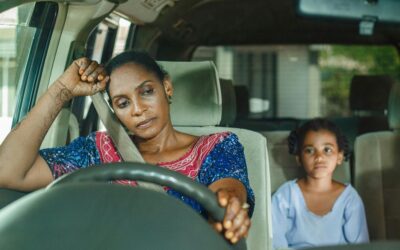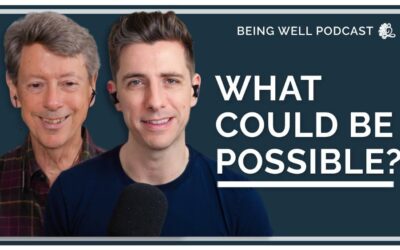See how recognizing and addressing negative patterns can turn them into strengths, empowering you to parent more consciously and compassionately with this article from Parents.com.

There is unfortunately no official guide for raising happy children. In fact, in the early years of parenting, most of us are so caught up in the details of how to get the baby to latch and the best brand of diapers that we don’t even take into consideration the difficult task of ensuring that we are raising trauma-free humans.
It isn’t until our kids’ behavior starts making us question our sanity and capabilities that we realize how ill-prepared we are to confront the “big” stuff—and how much we genuinely could benefit from having that non-existent guide.
One thing my children taught me about myself early on was that I had some unresolved childhood trauma that was reflected in my own parenting. I never considered myself a candidate for childhood trauma. From what I could remember, I had a great childhood. I thought you had to either be abused or abandoned to have had trauma and because I had not experienced either, I thought didn’t qualify.
I later learned that everyone’s trauma looks different, and it can be created by even the most well-intended parents. Some 60% of adults report having had at least one adverse childhood experience, including growing up in a family with mental illness, substance use problems, or divorce.[1]
Signs of Unresolved Trauma
Unresolved childhood trauma looks different for everyone, but the following are common experiences among people with unresolved trauma: [2]
- Persistent fatigue
- Sleep disorders or nightmares
- Anxiety
- Depression
- Avoidance of emotions, sensations, or activities that are associated with the trauma, even remotely
- Mood swings
- Difficulty making decisions
- Belief that feelings or memories are “dangerous”
My unresolved trauma caused me to be impatient, easily frustrated, and lacking in proper communication skills with my children. I often found myself feeling guilty about how I responded to their behavior and again wishing I had that guide on how to be a better mother for them. What I learned is that the trauma itself was a guide for being the best version of myself for my children. Here’s how I drew upon my unresolved trauma to be a more kind, intentional, and mindful parent.
Turn the Don’ts Into Do’s
There’s one important gift our trauma gives us that we often take for granted. While we may not know exactly what we want our child’s upbringing to look like, trauma gives us the power to know what we don’t want it to look like.
Most of us can trace back in our minds to significant moments in our childhood when we said to ourselves, “I will never do this to my kids.” I can distinctly remember being a child and telling myself on several different occasions that I would never yell at my kids because I didn’t like how it physically and mentally made me feel. Still, early in my children’s lives I often found myself yelling at them out of pure frustration.
Then, I decided to turn my “don’ts” (the things I experienced that I don’t want my child to experience) into “do’s” (doing the opposite of that action). With that mindset, I was able to go back and collect those memories of what made me feel anxious and scared and use them as mental instructions on how to act differently for my kids.
A Good Ol’ Dose of Reparenting
Reparenting is a huge topic of conversation these days, and people all over the world have been using this technique as a way to heal their inner child. In simple terms, reparenting is a process of homing in on and healing our abandoned wounds to positively impact our mental health and the way we function in everyday life.[3]
I’m no longer a child, and I can’t undo my childhood or the way my parents raised me, but I do have the power to help change the parts of me that trace back to trauma. One of the amazing things we have that most of our parents didn’t have is access to unlimited free information and resources to aid us in making better choices. I used this to my advantage! I identified positive skills my parents never taught me (like healthy communication), reparented myself, and changed my own behavior and parenting.
Where There’s Trauma, There’s Healing
Recognizing that you have unresolved trauma is scary and it can feel never-ending. The constant triggers and failures can make any person feel like a burden on their entire family. However, the beautiful thing is that we all have the choice and ability to heal.
A saying that helped me through my moments of hopelessness: “I have power over my trauma; it does not have power over me.” If I have trauma that is negatively impacting my life, then I also have permission to dismiss it. I found that by not giving it power, I was beginning my journey to healing.
There’s a quote by Oprah Winfrey that says, “Whatever you fear most has no power; it is your fear that has the power.” I remember hearing this quote at a peak point in my journey, and it really spoke to me. My trauma only had as much power over me as I allowed it because the real power wasn’t in the trauma. It was in the fear that I would never recover from it; the fear that I would never be good enough for my children; and the fear that my husband would leave me because I was too damaged. These were the crippling thoughts that fueled my trauma.
I changed my narrative by not only pursuing a journey to heal from the trauma but also talking about it. For me, this is where my deepest and most fulfilling form of empowerment came from. We are programmed from a young age to be light, happy, and positive. We are most often taught that our problems and emotions are not big enough or important enough to need to be discussed. However, times have changed and we are now living in a time that embraces the freedom to be vocal about our past and our trauma as a means to connect and heal as a village.
When I started talking about my trauma, I realized how many other people needed to hear it in order to validate and begin healing from their own. I realized that despite what my trauma “wanted” me to feel, I was not alone. While it probably would have been nice to not have experienced trauma to begin with, I can honestly say that it guided me toward becoming the person and parent I am today, and I think this person is pretty amazing.
References
- Vital Signs: Estimated Proportion of Adult Health Problems Attributable to Adverse Childhood Experiences and Implications for Prevention — 25 States, 2015–2017. Centers for Disease Control and Prevention. 2019.
- Trauma Informed Care in Behavioral Health Services. Substance Abuse and Mental Health Services Administration. 2014.
- Reclaiming the Inner Child in Cognitive Behavioral Therapy: The Complementary Model of the Personality. The American Journal of Psychotherapy. 2018.
Visit the original article here.



